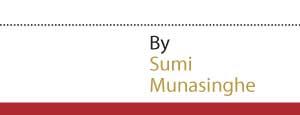Reply To:
Name - Reply Comment
Government curriculum to suit post-COVID way of life

From all the international and local media we see, it is apparent that there would be a paradigm shift in the way we live and conduct our businesses and daily life after Covid-19.
"Why it is essential to introduce multidisciplinary courses at the university level"
Artificial intelligence and blockchain technology are here to stay. For example. Singapore and Dubai have already switched to this new world order.
Another example is that our school-going children were thrust on to Zoom / Microsoft Teams and other online communication platforms during the lockdown, and most students who had access to tablets and mobile phones are already conversant with this new way of communicating and can follow online classes and complete homework set by the school.
Our former PM who understands what’s going on in the world and proposed free WIFI and tablets to students in Advanced Level classes, but the disruptive lawmakers shouted it down. 
This method of teaching is here to stay. Covid-19 has simply accelerated a trend that was coming.
Universities like Oxford, Cambridge and several of the US Ivy League colleges have commenced this academic year on online platforms, offering virtual tuition.
Imagine if one of our students from a school here can enrol to a faraway country University degree course, without having to leave Sri Lanka, how we can truly produce very highly educated young citizens to meet the challenges of the new world order.
Our lawmakers in charge of education need to understand the new world order and introduce multi-disciplinary courses online during the school holidays.
Students in accountancy, management and finance must know about engineering and economics and vice versa.
Written and spoken fluency in English should be mandatory, from Kindergarten upwards.
Besides the use and proficiency of computers and ICT knowledge, to the level set by the London GCSE standard must be introduced to all students from Grade 6 (After the 5th Standard Scholarship Exams) onwards.
"Increasing the number of university intakes to produce unemployable graduates is not the answer. The solution is to make graduates more employable across a multi-skilled and competitive spectrum. "
Increasing the number of university intakes to produce unemployable graduates is not the answer. The solution is to make graduates more employable across a multi-skilled and competitive spectrum. Those who are interested in vocational work must be allowed to follow classes in masonry, carpentry, electricity (building wiring etc), and plumbing under tax-funded education system, we must award them an internationally recognized professional qualification after Ordinary Level.
The value and importance of vocational qualifications must not be discounted and several European countries including the UK, are now realising how vital this sector of the economy is. Especially in the UK after the Brexit.
Healthcare professionals such as nursing staff, healthcare workers and attendants must all be valued and given training and qualifications which place them on a globally competitive employment field.
Countries such as the Philippines are doing this extremely well and can export skilled healthcare workers to European nations where there is a very demand for such skills.
"From all the international and local media we see, it is apparent that there would be a paradigm shift in the way we live and conduct our businesses and daily life after Covid-19.
Artificial intelligence and blockchain technology are here to stay. For example. Singapore and Dubai have already switched to this new world order"
We must stop sending our women as domestic workers to the Middle East.
Instead, we should be looking to train them to be English speaking nurses, physiotherapists, caregivers, who can command much higher basic salaries.
It’s the responsibility of the Government in the office to provide that this vocational training, under State taxpayer-funded education, and issue internationally recognized certificates for them to gain employment.
University of the people is the world’s first non-profit, tuition-free, accredited online university.
With a groundbreaking online learning model and instructors from the world’s foremost academic institutions, UoPeople offers the opportunity of a high-quality, accessible, affordable American degree programs.
The university offers associate and bachelor’s degree programs in business administration, computer science, and health science, as well as master’s degree programs in business administration and education. Classes are taught by globally leading faculty from NYU and UC Berkeley.
Annual tuition for international students: University of the People is tuition-free, which means there is no charge for teaching or instruction. To help support the university’s continued operation, UoPeople Assessment Fee per course completed.
The estimated total fees for the associate degree at the (UoPeople )are as followed: $2,060. The estimated total fees for the bachelor’s degree are as followed: $4,060. Percentage of international students: 54%.